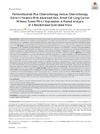Identificador persistente para citar o vincular este elemento:
https://accedacris.ulpgc.es/jspui/handle/10553/74678
| Título: | Pembrolizumab plus chemotherapy versus chemotherapy alone in patients with advanced non–small cell lung cancer without tumor PD-L1 expression: A pooled analysis of 3 randomized controlled trials | Autores/as: | Borghaei, Hossein Langer, Corey J. Paz-Ares, Luis Rodríguez-Abreu, Delvys Halmos, Balazs Garassino, Marina C. Houghton, Baerin Kurata, Takayasu Cheng, Ying Lin, Jianxin Pietanza, M. Catherine Piperdi, Bilal Gadgeel, Shirish M. |
Clasificación UNESCO: | 320101 Oncología 3209 Farmacología |
Palabras clave: | Antineoplastic Agents Combined Drug Therapy Non–Small Cell Lung Cancer Pembrolizumab Programmed Cell Death Ligand 1 Protein (Human Cd274 Protein) |
Fecha de publicación: | 2020 | Publicación seriada: | Cancer | Resumen: | Background: Pembrolizumab plus platinum-based chemotherapy has demonstrated improved clinical outcomes over chemotherapy alone in patients with previously untreated advanced/metastatic non–small cell lung cancer (NSCLC), regardless of tumor programmed death ligand 1 (PD-L1) expression. This study pooled data from 3 randomized controlled trials to evaluate outcomes with pembrolizumab plus chemotherapy versus chemotherapy alone in patients with advanced/metastatic NSCLC negative for PD-L1 (ie, a tumor proportion score < 1%). Methods: Individual patient data were pooled from KEYNOTE-021 cohort G (nonsquamous; NCT02039674), KEYNOTE-189 (nonsquamous; NCT02578680 and NCT03950674), and KEYNOTE-407 (squamous; NCT02775435). Treatment comprised pembrolizumab plus chemotherapy (pemetrexed and platinum for nonsquamous histology and carboplatin and paclitaxel/nab-paclitaxel for squamous histology) or chemotherapy alone. Responses were assessed according to Response Evaluation Criteria in Solid Tumors version 1.1 by blinded, independent, central review. No α was assigned to this descriptive, exploratory analysis. Results: Four hundred forty-four of the 1328 patients (33.4%) who were enrolled across the 3 trials had PD-L1‒negative tumors (256 on pembrolizumab plus chemotherapy [nonsquamous, n = 155; squamous, n = 94; other, n = 7] and 188 on chemotherapy alone [nonsquamous, n = 83; squamous, n = 99; other, n = 6]). The median time from randomization to the data cutoff was 28.0 months (range, 14.7-55.4 months). Pembrolizumab plus chemotherapy improved overall survival (OS; hazard ratio [HR], 0.63; 95% CI, 0.50-0.79) and progression-free survival (HR, 0.68; 95% CI, 0.56-0.83) over chemotherapy. Sixteen patients in the pembrolizumab plus chemotherapy arm completed 2 years of treatment; the objective response rate was 87.5% (95% CI, 61.7%-98.4%), and the 3-year OS rate was 100%. Adverse events (AEs) were experienced by 99.2% of the patients who received pembrolizumab plus chemotherapy and by 98.9% of the patients who received chemotherapy alone, with grade 3 or higher AEs occurring in 71.4% and 72.0%, respectively; immune-mediated AEs and infusion reactions were experienced by 29.0% and 12.4%, respectively. Conclusions: Pembrolizumab plus chemotherapy demonstrated response and survival improvements with manageable safety in comparison with chemotherapy alone in PD-L1‒negative advanced/metastatic NSCLC, and it is a standard-of-care first-line therapy for patients with advanced NSCLC, regardless of PD-L1 expression. LAY SUMMARY: Some tumors produce a protein called programmed death ligand 1 (PD-L1), which interacts with the body's immune system and prevents an immune response against cancer. Antibody therapies such as pembrolizumab block interactions between tumor PD-L1 and the immune system and enable an immune response. Used alone, pembrolizumab provides benefit for patients with non–small cell lung cancer (NSCLC) tumors that produce PD-L1. However, when it is combined with chemotherapy, which can stimulate anticancer immune responses, pembrolizumab provides a benefit, regardless of tumor PD-L1 production. This article shows that among patients with NSCLC whose tumors produce no PD-L1, outcomes are better with pembrolizumab plus chemotherapy in comparison with chemotherapy alone. | URI: | https://accedacris.ulpgc.es/handle/10553/74678 | ISSN: | 0008-543X | DOI: | 10.1002/cncr.33142 | Fuente: | Cancer [ISSN 0008-543X], v. 126(2), p. 4867-4877 |
| Colección: | Artículos |
Citas SCOPUSTM
87
actualizado el 08-jun-2025
Citas de WEB OF SCIENCETM
Citations
94
actualizado el 01-feb-2026
Visitas 10
194
actualizado el 04-may-2024
Descargas
309
actualizado el 04-may-2024
Google ScholarTM
Verifica
Altmetric
Comparte
Exporta metadatos
Los elementos en ULPGC accedaCRIS están protegidos por derechos de autor con todos los derechos reservados, a menos que se indique lo contrario.
